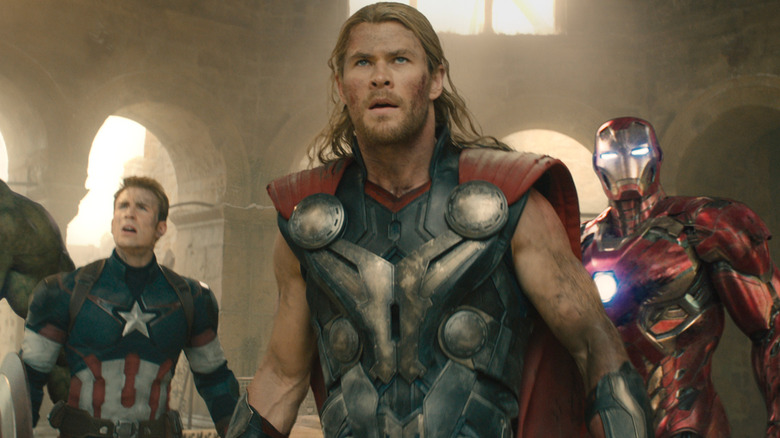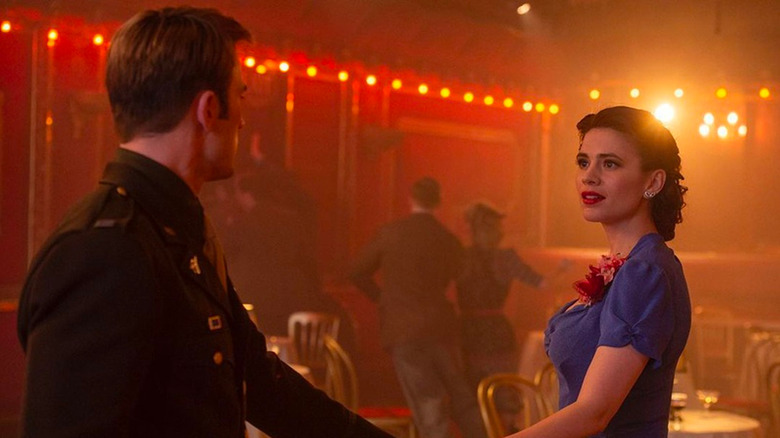Giving Characters A Resolution Was Never Joss Whedon's Goal With The MCU
For all the allegations of his behavior that have surfaced in recent years, it's hard to deny the impact that Joss Whedon had on Hollywood in his prime. Whedon was pretty much a master of ensemble pieces before he was tapped to write and direct "The Avengers" in 2010 — but "The Avengers" was much bigger in scale compared to "Buffy the Vampire Slayer," "Firefly" or "Serenity," the TV shows that put him on the map in the '00s.
Shortly before "The Avengers" released in 2012, Whedon spoke to Den of Geek about the challenges of writing the film. One of the bigger hurdles came in uniting so many different characters, each who'd headlined their own respective projects and existed in wildly different worlds. "You don't try to make anybody else's movie," Whedon explained. "Jon Favreau's going to do a thing, [Kenneth Branagh] is going to do a thing. I'm going to do something else ... You have all of these disparate elements, you just have to create an atmosphere, and a look, where they all seem to feel natural."
Whedon was surprisingly breezy about the exhausting ordeal, even when it came to working within the parameters of Marvel's Cinematic Universe. As "unmeddlesome" as Marvel was with his creative vision, Whedon still had to juggle a lot with "Avengers." Not only was the writer-director tasked with blending these different heroes seamlessly into one world — and without undermining the foundation that earlier writers and directors had already established — but he also had to make sure the individual Avenger's stories could continue beyond his MCU entry.
'I'm not going to do something that's going to make Captain America 2 impossible'
Whedon compared the MCU to the original Marvel comics in his conversation with Den of Geek. Telling a story within a shared cinematic universe is not unlike the process of crafting a story under the guidance of a story editor, as Marvel Studios provided a set of guidelines for Whedon's "Avengers" script: "They said, 'Here are the things we need; here is the villain, we want this to happen; we need the conflict here; here's the third act, it will involve the following.'" But Whedon also had to "respect" Marvel Studio's plans for the larger universe, and that made restraint a necessity. "I'm not going to do something that's going to make 'Captain America 2' impossible," Whedon said. "I am trying to tee them up as much as I'm recovering from whatever they gave me." Whedon continued:
"There is a little bit of 'Right, how can I progress the characters, without solving all their problems?' I like things where you feel the resolve is 'We've made a step forward,' not 'We've completed the journey.' That's something with 'Buffy' that we were very strict about, it wasn't 'Well we've certainly cured that guy's ills forever!' It was like 'Okay, we've saved him from the thing, and eventually maybe he'll be able to deal with the trauma.' It's always a process."
The mysterious process has always been a little frustrating for fans who want a resolution to some of the MCU's simpler threads. It took Steve Rogers (Chris Evans) almost ten years to let go of the past — and his first love, Peggy Carter (Hayley Atwell) — in spite of Whedon's efforts to expedite that process. Of course, that's the nature of the beast. With so many cooks in the kitchen, it's more about the journey than the destination.

